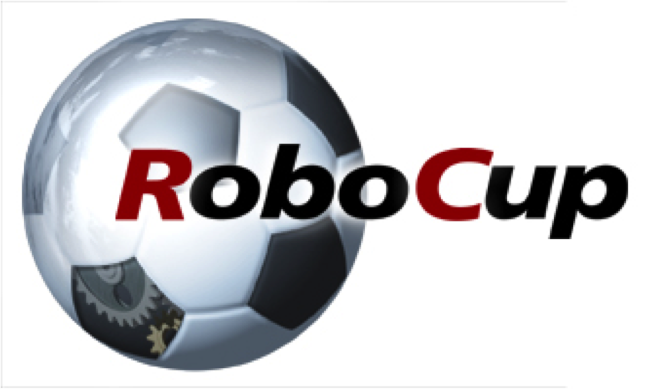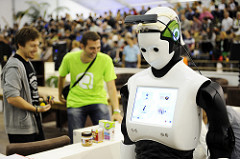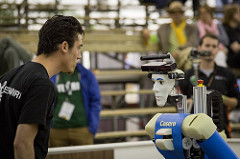

Date: Friday, September 1st, 2017 (half-day, 2:00-6:00 pm)
Room: Alter Real



One of the effective ways to promote science and engineering research is to set a challenging long term goal. RoboCup is an internationally renowned competition to promote robotics and AI research. RoboCup was initially set and continues to offer a publicly appealing, but formidable challenge, namely robot soccer. RoboCup introduced a novel competition framework to enable for a seamless flow of the innovation from the soccer grand challenge to a variety of robotic applications, that can have a positive impact on our society, including creating competitions for young students, RoboCupJunior, in service robots, RoboCup@Home, rescue robotics, RoboCupRescue, and in logitistics, RoboCup@Work. We have create an IEEE Technical Committee on RoboCup, with a goal to promote and stimulate technical discussions arising from RoboCup challenges inside the robotic scientific community, through workshops and other dedicated initiatives. This workshop targets the specific topic of service robots, as in RoboCup@Home.
RoboCup@Home "aims to develop service and assistive robot technology with high relevance for future personal domestic applications." RoboCup@Home is the largest international annual competition for autonomous service robots. A set of benchmark tests is used to evaluate the robots' abilities and performance in a realistic non-standardized home environment setting, with carefully designed and developed performance evaluation metrics. A key technical challenge in RobCup@Home is Human-Robot-Interaction. Hence, the aim of this workshop is to present the challenges and technical developments addressed by RoboCup@Home to the research community in Human-Robot Interaction.
The workshop is especially timely, as RoboCup@Home has just launched the standard platform league by selecting two platforms, namely the Softbank Pepper and the HR Toyota Robots. The adoption of standard platforms can be beneficial in several respects. On one hand it will make the competition framework more accessible to the researchers in HRI as the standard platform allows to focus on the HRI development, by exploiting exhaustive solutions for the basic functions. On the other hand, the use of a standard platform allows for a more specialized setting for benchmarking and comparison of the results of experiments aiming at assessing manifold design choices in HRI. In this respect, the workshop will also provide a forum to discuss the approach to benchmarking in other competitions, in particular the European Robotics League on Service Robots.
The workshop aims to address a broad range of aspects concerning Human Robot Interaction in the context of service and personal robots for a home and public scenarios.
Keywords: Gesture, Sound, Non-verbal communication, Facial expressions, Joint Actions, Behaviour Recognition, Proxemics, Spoken Language Interaction, Human Robot Dialogues, Social navigation, Social rules, HRI Testing, Performance Evaluation, Benchmarking.
The introductory talk will provide an overview of the development of competitions on service robots to set the context to the audience of the workshop and to illustrate the technical programme. In particular, the presentation will focus on the development of RoboCup@home launched in 2006, Bremen. After a quick overview of the development and progress achieved in more than a decade of experience in RoboCup@Home, the newly introduced Standard Platform Leagues will be addressed. Finally, the new RoboCup@Home education initiative will be presented, which is intended to target the younger generation and, eventually be included in the RoboCup junior competition framework.
The European Robotic League (ERL) is an innovative concept for robot competitions. The ERL is composed of multiple Local Tournaments, held in different research labs across Europe, with certified test beds, and a few competitions as part of Major Tournaments, such as RoboCup. Teams participate in a minimum of 2 tournaments (Local and/or Major) per year and get scores based on their performances. A final end of year score is computed for each team, per Task Benchmark (TBM) and Functionality Benchmark (FBM), using the best two participation in tournaments, and teams are ranked based on their final score. Prizes for the top teams (per TBM and FBM where they have participated) are awarded during the next year's European Robotics Forum (ERF).
The ERL Service Robots challenge stems from its predecessor, the RoCKIn@Home competition, and focuses on the domain of service robotics for home application. In this talk I will cover some of the research topics tackled by this challenge, which include human-aware indoor navigation, object detection, recognition and location, semantic mapping, object grasping and knowledge representation and planning under uncertainty. I will also refer to the developments in ERL Service Robots, one year after its deployment.
We are evolving, so as our society, and our homes, our lifestyle and our needs. AI and Robots have been with us for decades, and now together they are penetrating more in our day-to- day life. This is a revolution towards creating an intelligent eco-system of living, where robots will coexist with us in harmony, for a smarter, healthier, safer and happier life. The talk will reinforce that service robots have interesting applications, including their roles in homes, and that as a robotics industry, SoftBank Robotics' R&D and Innovation is around the centrality of wellbeing of people. The time has arrived, when social robots have started to be deployed, evaluated and available for practical purposes outside automation industry. For example, Pepper robot from SoftBank Robotics, which is also the standard platform for Robocup@Home, is mass produced and already being used in thousands of homes, and at public places. The first part of the talk will illustrate some of the use cases, market analysis and potential applications for such intelligent humanoid robots, grounded with some key European Union Projects. The second part will present the feedback and needs from the real users and highlight some of the immediate R&D challenges from industrial perspective. The third part will point about how the Robocup@Home competition is targeting to address those needs and challenges and building a community around this. The talk will conclude with some open and grand challenges ahead, including social and ethical issues.
HRI for Service Robots in RoboCup@Home
Workshop of the IEEE International Symposium on Robot and Human
Interactive Communication (IEEE RO-MAN 2017)
Lisbon, Portugal, September 1st, 2017 (half day workshop).
http://www.diag.uniroma1.it/~labrococo/hri-for-service-robots
The aim of this workshop (which is organized by the IEEE TC on RoboCup) is to present the challenges and technical developments addressed by RoboCup@Home to the research community in Human-Robot Interaction and to acquire feedback on the technical challenges in HRI, to be pursued through robotic competitions for benchmarking the performances of Service Robots. The workshop is especially timely, as RoboCup@Home has just launched the standard platform league by selecting two platforms, namely the Softbank Pepper and the HR Toyota Robots. The adoption of standard platforms can be beneficial in several respects. On one hand it will make the competition framework more accessible to the researchers in HRI as the standard platform allows to focus on the HRI development, by exploiting exhaustive solutions for the basic functions. On the other hand, the use of a standard platform allows for a more specialized setting for benchmarking and comparison of the results of experiments aiming at assessing manifold design choices in HRI. In this respect, the workshop will also provide a forum to discuss the approach to benchmarking in other competitions, in particular the European Robotics League on Service Robots (ERL-SR). The technical programme of the workshop will include:
We solicite contributions to the panel discussion in the form of a position paper of 2 pages to be mailed at capobianco [AT] dis [dot] uniroma1 [dot] it by July 20th. The earlier, the better. We will send acceptance notifications and make the final programme available shortly afterwords.
Confirmed speakers:
Pedro Lima (IST, Lisbon), Francesco Ferro (Pal
Robotics), Amit Kumar Pandey (Softbank Robotics), Winners of RoboCup
2017, Participants of ERL event at IEEE Ro-Man.